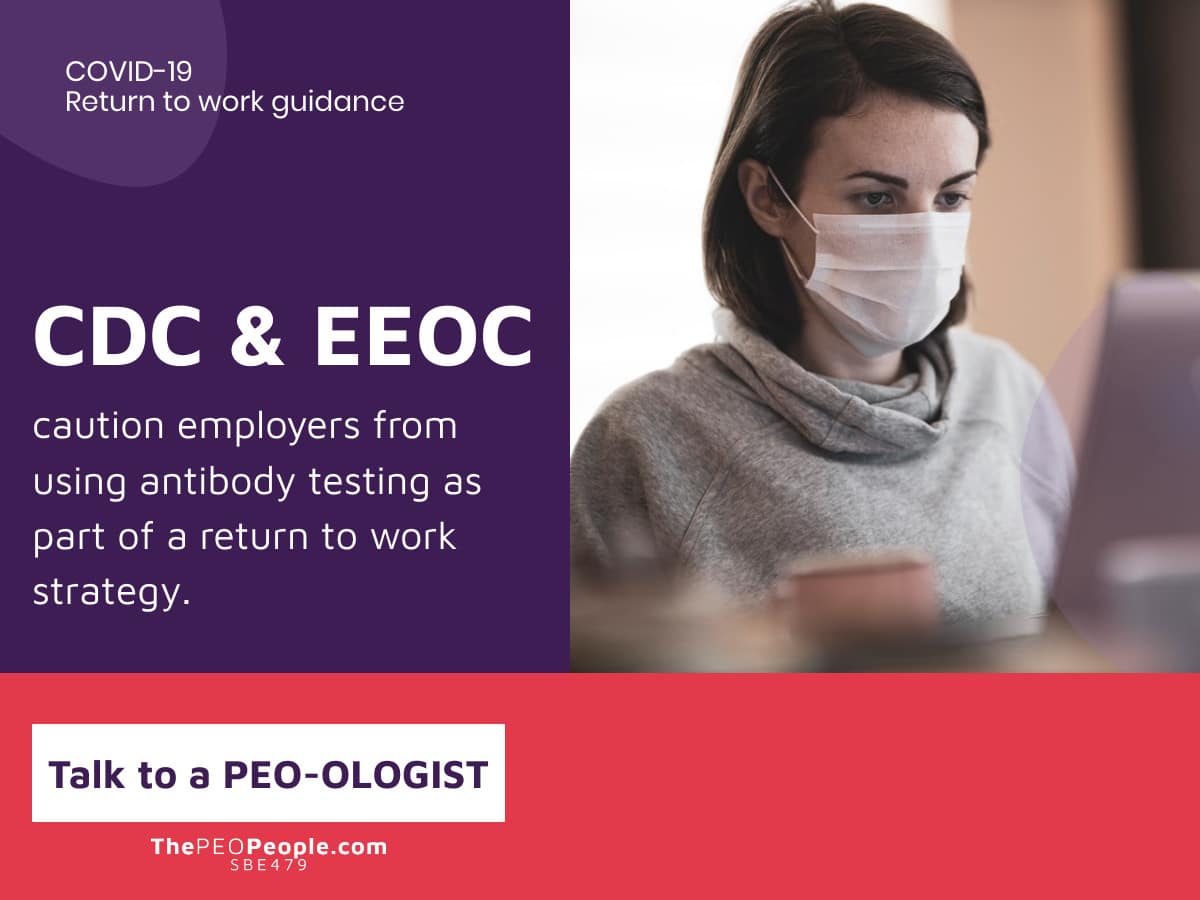
EEOC Antibody Testing Guidance
The Centers for Disease Control (“CDC”) and the Equal Employment Opportunity Commission (“EEOC”) are cautioning employers from using antibody testing as part of a return to work strategy. This guidance is based on information known to date and could be revised in the future should antibody testing become more reliable. For now, antibody testing should not be used in return to work strategies.

It should be noted that group health plans must cover COVID-19 testing, and other services resulting in the order for a COVID-19 test, without cost-sharing (i.e., no copays or deductibles), through the end of the emergency period (currently July 25, 2020, unless extended or shortened).
An antibody test in this context would be covered at 100%. Generally, such a test would relate to the items and services furnished during a healthcare provider’s office visit for the evaluation of an individual for COVID-19 and is not part of a return to work strategy.
The following provides additional background.
Antibody Test for COVID-19
An antibody test for COVID-19 may tell an individual whether they had a previous infection. Although these tests should not be used at this time to determine if an individual is immune, these tests can help determine the proportion of a population previously infected with COVID-19 and provide information about populations that may be immune and potentially protected. According to the CDC, an antibody test may not show the presence of a current infection because it may take 1-3 weeks after infection to make antibodies.
As of June 16th, 2020, only 19 tests have Emergency Use Authorization, with most still requiring lab-based processing. To date, no antibody test has received FDA approval.
![]() CDC Antibody Testing Guidelines
CDC Antibody Testing Guidelines
On May 23, 2020, the CDC released interim guidance for COVID-19 antibody testing in clinical and public health settings. Due to the limitations of the test, false-positive test results, lack of FDA approval status, and the need for additional data, the CDC directs that antibody testing should not be used to make decisions about returning persons to the workplace. Further, antibody tests should not be used to make decisions about grouping persons residing in or being admitted to congregate settings, such as schools, dormitories, or correctional facilities.
EEOC Antibody Testing Guidelines
Citing the CDC guidelines noted above, on June 17, 2020, the EEOC updated Frequently Asked Questions (FAQs) regarding COVID-19 and the Americans with Disabilities Act (“ADA”), Rehabilitation Act, and other EEO laws. In FAQ A.7, the EEOC makes it clear that under the ADA an employer may not require antibody testing before permitting employees to re-enter the workplace.
According to the EEOC, an antibody test constitutes a medical examination under the ADA. At this time, the antibody test does not meet the ADA’s “job related and consistent with business necessity” standard for medical examinations or inquiries for current employees.
The EEOC points out that an antibody test differs from a viral test to determine if someone has an active case of COVID-19. The EEOC has stated in previous guidance that a COVID-19 viral test is permissible under the ADA (FAQ A.6).
Employer Action
In light of the CDC and EEOC guidance, employers should not use antibody testing as a part of a return to work strategy. Employers should review their return to work strategies with employment counsel to ensure compliance with the ADA, state and local law.
Talk to your PEO-OLOGIST if you have more questions about streamlining your employees back to work.

